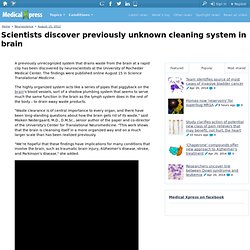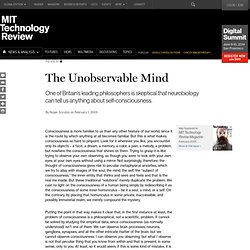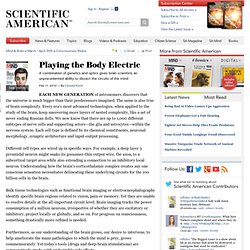

Scientists discover previously unknown cleaning system in brain. A previously unrecognized system that drains waste from the brain at a rapid clip has been discovered by neuroscientists at the University of Rochester Medical Center.

The findings were published online August 15 in Science Translational Medicine. The highly organized system acts like a series of pipes that piggyback on the brain's blood vessels, sort of a shadow plumbing system that seems to serve much the same function in the brain as the lymph system does in the rest of the body – to drain away waste products. "Waste clearance is of central importance to every organ, and there have been long-standing questions about how the brain gets rid of its waste," said Maiken Nedergaard, M.D., D.M.Sc., senior author of the paper and co-director of the University's Center for Translational Neuromedicine. "This work shows that the brain is cleansing itself in a more organized way and on a much larger scale than has been realized previously. Hackers backdoor the human brain, successfully extract sensitive data. With a chilling hint of the not-so-distant future, researchers at the Usenix Security conference have demonstrated a zero-day vulnerability in your brain.

Using a commercial off-the-shelf brain-computer interface, the researchers have shown that it’s possible to hack your brain, forcing you to reveal information that you’d rather keep secret. As we’ve covered in the past, a brain-computer interface is a two-part device: There’s the hardware — which is usually a headset (an EEG; an electroencephalograph) with sensors that rest on your scalp — and software, which processes your brain activity and tries to work out what you’re trying to do (turn left, double click, open box, etc.) BCIs are generally used in a medical setting with very expensive equipment, but in the last few years cheaper, commercial offerings have emerged. For $200-300, you can buy an Emotiv (pictured above) or Neurosky BCI, go through a short training process, and begin mind controlling your computer.
The Unobservable Mind. Consciousness is more familiar to us than any other feature of our world, since it is the route by which anything at all becomes familiar.

But this is what makes consciousness so hard to pinpoint. Look for it wherever you like, you encounter only its objects – a face, a dream, a memory, a color, a pain, a melody, a problem, but nowhere the consciousness that shines on them. Trying to grasp it is like trying to observe your own observing, as though you were to look with your own eyes at your own eyes without using a mirror. Not surprisingly, therefore, the thought of consciousness gives rise to peculiar metaphysical anxieties, which we try to allay with images of the soul, the mind, the self, the “subject of consciousness,” the inner entity that thinks and sees and feels and that is the real me inside. But these traditional “solutions” merely duplicate the problem. This appropriation of the question by philosophy is apt to make scientists impatient. But will we? Brain wave function. Mycoted.
Info on brain excercising. Scientists discover how the brain encodes memories at a cellular level. (Santa Barbara, Calif.) –– Scientists at UC Santa Barbara have made a major discovery in how the brain encodes memories. The finding, published in the December 24 issue of the journal Neuron, could eventually lead to the development of new drugs to aid memory. The team of scientists is the first to uncover a central process in encoding memories that occurs at the level of the synapse, where neurons connect with each other.
"When we learn new things, when we store memories, there are a number of things that have to happen," said senior author Kenneth S. Kosik, co-director and Harriman Chair in Neuroscience Research, at UCSB's Neuroscience Research Institute. Kosik is a leading researcher in the area of Alzheimer's disease. "One of the most important processes is that the synapses –– which cement those memories into place –– have to be strengthened," said Kosik. This is a neuron. (Photo Credit: Sourav Banerjee) Part of strengthening a synapse involves making new proteins. Playing the Body Electric. EACH NEW GENERATION of astronomers discovers that the universe is much bigger than their predecessors imagined.

The same is also true of brain complexity. Top 10 Brain Myths" At one time in history, decapitation was one of the preferred methods of execution, in part thanks to the guillotine.

Although many countries that execute criminals have dispatched with the method, it's still performed by certain governments, terrorists and others. There's nothing more final than the severing of one's head. The guillotine came about because of the desire for a quick, relatively humane death. But how quick is it? Jellied Century-Old Brains Reveal Secrets of Mental Illness. Among the bloodletting boxes, ether inhalers, kangaroo-tendon sutures and other artifacts stored at the Indiana Medical History Museum in Indianapolis are hundreds of scuffed-up canning jars full of dingy yellow liquid and chunks of human brains.

Brain Fitness and Cognitive Health Authority: Market Research and Advisory Services. How the brain perceives shades of gray. How the brain perceives color is one of its more impressive tricks.

It is able to keep a stable perception of an object's color as lighting conditions change. Sarah Allred, an assistant professor of psychology at Rutgers-Camden, has teamed up with psychologists from the University of Pennsylvania on groundbreaking research that provides new insight into how this works. Allred conducted the research with Alan L.
The Brain—Information about the Brain. 1 Introduction “I think, therefore I am.”

—René Descartes, 17th-century philosopher Few of us question the crucial importance of the brain. It is vital to our existence. Our brains enable us to think, as René Descartes so skillfully pointed out nearly 400 years ago.